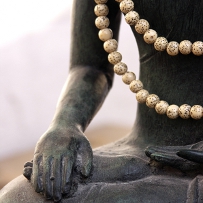|
|
|
|
|
 |

|

|

|
The greatest gift is the
gift of the teachings
|
|

|
| |
|
Dharma Talks
given at Spirit Rock Meditation Center
|
2018-01-10
Not Knowing But Keeping Going 1
61:50
|
|
Donald Rothberg
|
|
|
We explore the centrality of the practice of "not knowing," that helps us to move from ordinary knowing to extraordinary knowing. We examine both the obvious value of many kinds of knowing and the shadow side of knowing, including its habitual and often addictive nature. Then we look at three ways of practicing not knowing: (1) in our mindfulness practice; (2) in listening to others as a practice; and (3) in being with transitional periods in our lives, when some important aspect of our lives remains unresolved.
|
|
Spirit Rock Meditation Center
|
|
|
2018-01-06
Building and Rebuilding Trust - Part 2
2:09:56
|
|
David Richo
|
|
|
Though we cannot always trust others, we can choose to act with trustworthiness toward others no matter how they treat us. As we practice unconditional trustworthiness we notice a wonderful result: We become less disappointed when others fail us. Our focus has shifted from ourselves as victims of others’ betrayals to our own commitment to trustworthiness. We still see that some people are not trustworthy and we feel sadness and compassion. But as long as we do not follow suit, we are not as hurt as we once were—and we like ourselves more.
This workshop focuses not only on trust and trustworthiness in relationships but also in ourselves and in life's givens, what happens beyond our control, and the power of dharma in our lives.
We learn to build trust as relationships begin and see it grow as we mature in our commitment. Trust can be broken in relationships. We can find ways to heal the wounds such betrayals cause.
|
|
Spirit Rock Meditation Center
|
|
|
2018-01-06
Building and Rebuilding Trust: Part 1
2:04:31
|
|
David Richo
|
|
|
Though we cannot always trust others, we can choose to act with trustworthiness toward others no matter how they treat us. As we practice unconditional trustworthiness we notice a wonderful result: We become less disappointed when others fail us. Our focus has shifted from ourselves as victims of others’ betrayals to our own commitment to trustworthiness. We still see that some people are not trustworthy and we feel sadness and compassion. But as long as we do not follow suit, we are not as hurt as we once were—and we like ourselves more.
This workshop focuses not only on trust and trustworthiness in relationships but also in ourselves and in life's givens, what happens beyond our control, and the power of dharma in our lives.
We learn to build trust as relationships begin and see it grow as we mature in our commitment. Trust can be broken in relationships. We can find ways to heal the wounds such betrayals cause.
|
|
Spirit Rock Meditation Center
|
|
|
|
|
|
|
|
|